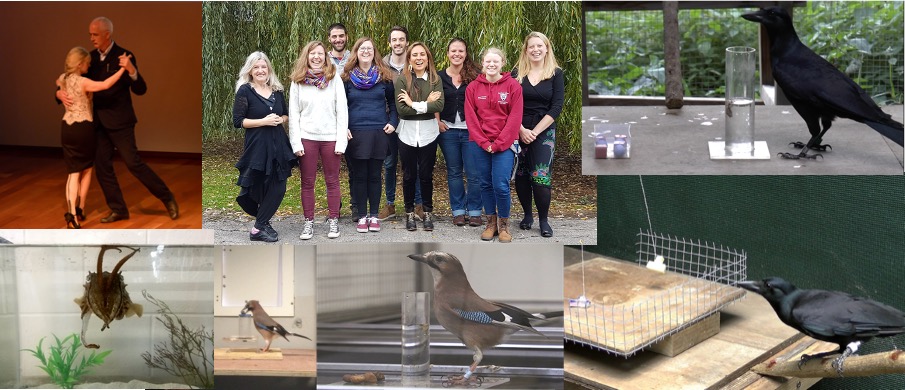Our research encompasses physical cognition (e.g. causal cognition), mental time travel (e.g. episodic-like memory and future planning) and social cognition (e.g. social learning). We do this by working with different species, such as western scrub-jays, Eurasian jays, rooks, New Caledonian crows, cuttlefish, octopi, squids, and humans. We are also interested in creating bridges between the arts and the sciences.
Lab group in October 2018. From left to right: Prof Nicky Clayton, Dr Camille Troisi, Dr Piero Amodio (back), Dr Anna Frohnwieser, Ben Farrar (back), Dr Alex Schnell, Dr Ljerka Ostojic, Dr Rachel Crosby, Dr Rachael Miller (Harrison) (missing Ning Ding)
Physical Cognition
We have recently finished a research project funded by a European Research Council Advanced Grant investigating the development and evolution of causal cognition. Our work focuses on similarities and differences in tool-using and problem-solving tasks in corvids, both the habitual tool-users e.g. New Caledonian crows, and other corvids that do not appear to use tools in the wild, e.g. jays and rooks, and in human adults and children.
Mental Time Travel
Our comparative research on mental time travel spans across various animal taxa, with studies on Californian scrub-jays, Eurasian jays, New Caledodian crows, cuttlefish and humans. We are specifically interested in understanding how different species plan for the future and how they may inhibit immediate behaviour for future rewards. Currently, we are developing new methodologies that can be used across species, to allow for more comparable research. We are also looking at episodic-like memory, particularly in cuttlefish. Recently, we have started investigating cross-cultural differences (China-UK) in children's cognitive development.
Social Cognition
Our work on social cognition has focused primarily on corvids, including studies of alliance formation and post-conflict behaviours in rooks, and food-sharing in jackdaws. Recent work has focused on courtship feeding in Eurasian jays, showing, for instance, that male jays adjust the food type that they share with their partner based on her current desire. We are continuing our long-standing research into perspective-taking abilities in corvids, and have expanded this work to study perspective-taking in humans.
Art and Science
Prof. Nicky Clayton, FRS, is a Scientist in Residence at Rambert, the UK's leading dance company, collaborating with Mark Baldwin, OBE, to choreograph works inspired by science ( e.g. Comedy of Change, 2009; Seven for a secret never to be told, 2011; What wild ecstasy, 2012). Clive Wilkins, MMC, is Artist in Residence and a writer and fine art painter, and has recently published a series of novels on memory and mental time travel, the Moustachio Quartet. Nicky and Clive have a Sciences-Arts collaboration, The Captured Thought, that explores the subjective experience of thinking, and its impact on memory and mental time travel. They met on the dance flour. A tango milonga in fact.
Nicky Clayton is the Founding Director of the Cambridge Centre for Integration of Science,Technology, and Culture, in consultation with the Co-Directors Clive Wilkings and Ruigang Michael Zhou.

